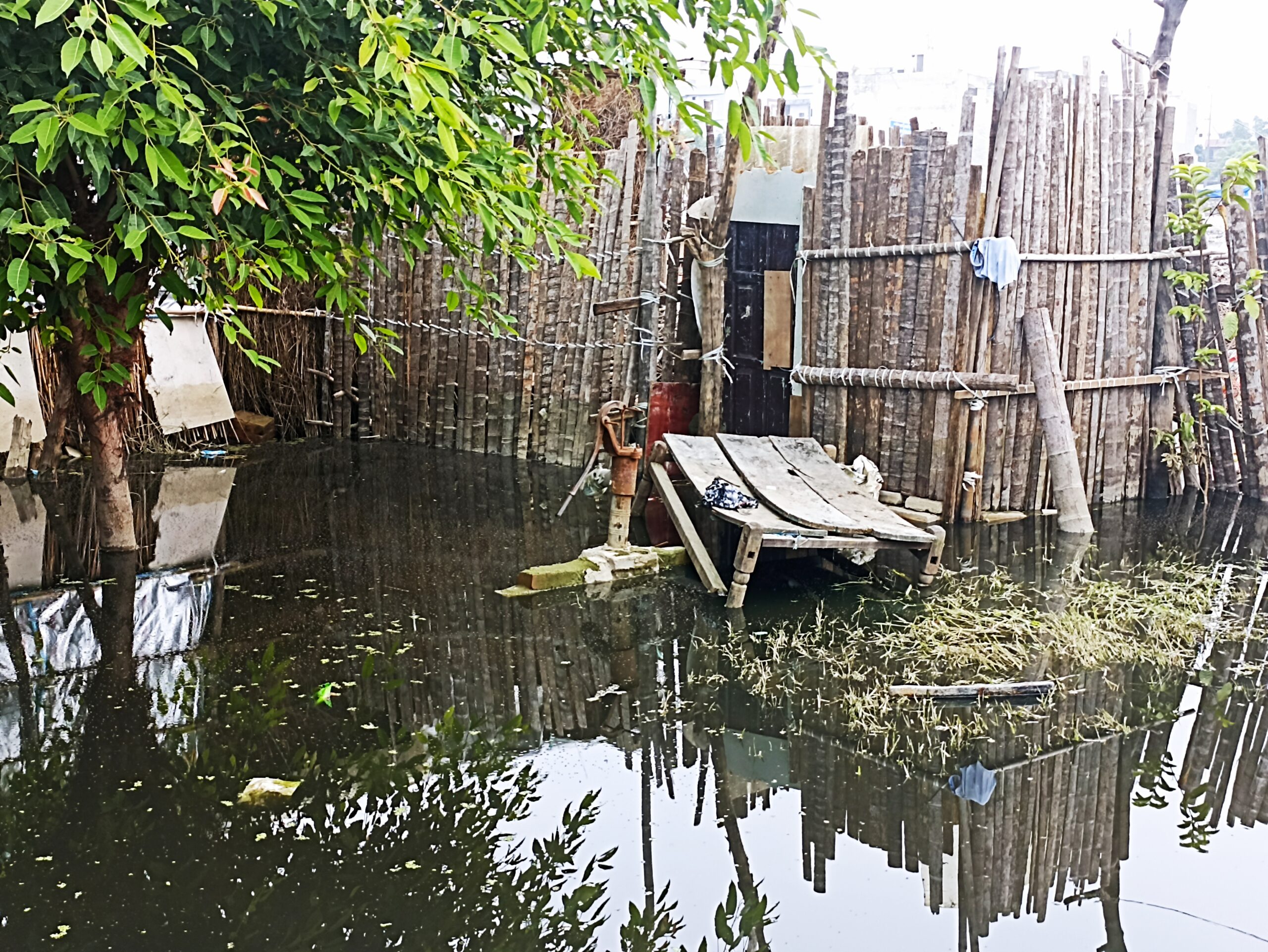
ALMOST DROWNED: A handpump submerged in flood water in Majlis Park
People living in refugee camps believe that they are being neglected during the ongoing flood and are being ignored because the government and authorities do not care about them.
Moolchand, a 32-year-old teacher from the Majlis Park Refugee Camp who came to India from Sindh, Pakistan, 13 years ago, says, “The only reason we came to India is because the authorities there didn’t care about us, whether we lived or died. We believed that the situation would be different here, but here also we are unheard.”
He admits that as refugees they are not entitled to all the rights and can’t have much expectation from the government, but he feels that in a dire situation like this, one should expect help from the authorities out of humanity.
“However, no help has been provided.”
The refugee camp at Majlis Park is home to 300-400 people living in mud-houses and engaging in daily wage labour.
According to the residents, the Yamuna floods have pushed them back by 2-3 years.
Laxmi, 64, says the situation has become worse.
“Half of our houses are covered in knee-deep water. There are snakes and other animals coming out of the forest. I myself have encountered two snakes in the last few weeks. We have children. We are worried that they’ll be harmed by the animals or drown. How are we supposed to survive in such situations?”
Mahesh Chand, 22, who lives in the camp, tells Patriot, “I had a small business selling phone covers, and I’ve lost goods worth 3,000 rupees, which will take me around one week to recover. Apart from that, we’ve lost goods in our home. We have also tried to contact media houses to show our condition, but no one came to visit or even replied properly. A lot of people have left these camps and moved to safer places, but we don’t have that luxury.”
When the Delhi Boat Rescue Club was asked about the same, an official requesting anonymity told Patriot, “We are covering all the major affected stretches, and the camp doesn’t fall under any drastically affected area. We had no idea that the camp was affected so badly. Also, no complaint came to us regarding the situation being so bad there.”
The situation didn’t change much at the Aruna Nagar Colony, opposite Majnu ka Tila. The residents complained against the authorities for not helping them in time of need.
Samten, 42, believes that residents could have been alerted in advance.
He goes on to say, “I own a garment shop in the market. All my garments are ruined. There’s still a lot of water inside my house. We are six members and are unable to even sleep comfortably. The residents have stood up for each other and helped each other, but those in power remain silent.”
Santem also recalls how, back in 2013, when water levels exceeded the barricades set up in the area to prevent water from entering the houses, an announcement was made in advance to all the residents in the area.
Karma Dorjee, President, Residents Welfare Association, New Aruna Nagar Colony, Majnu Ka Tila, says around 60 houses in the locality have been affected and people who used to live on the first floor are forced to move out and shift to different places
He goes on to say that they’ve done their best to keep the issue under control and haven’t required much support from the ‘outside world’.
On three days — July 15, 16, and 17, they served lunch, breakfast, and dinner to the affected residents.
He continues, “If the water level remains constant, we’ll have everything under control.”
Tibetan refugees devastated
The monastery market, a Tibetan refugee market noted for its garment shops, was devastated by Yamuna floods. Patriot visited the place, and found that restoration work with pest control and water-pump was underway. It gave the impression that the crisis was under control, but the truth was different.
When asked if he had received any assistance in restoration, Mahendar, 58, said, “What assistance are you referring to? The individuals who live here have paid for pest control, and the employees you see working on the site are paid 600 rupees a day to clear out the water, and also given meals. The only item supplied by the Public Works Department was the water pump, but we are also paying for the diesel it requires.”
He goes on to say that this is not the first time something like this has occurred.
“Most of the time, individuals in refugee camps are left alone. There’s a temple just behind the region that’s also partly buried in water, which we’ll clean on our own.”
Khargyal, 58, questioned the rationale of Delhi Chief Minister’s announcement of 10,000 rupees in compensation.
“The entire market has lost around 3.5 to 4 crore rupees in investment. Every shopkeeper here has lost at least a lakh. So, what’s the point of making such an announcement?” he says.
“In the previous week, society members have paid roughly 12-15,000 rupees for repair. Another 15-20,000 rupees would be spent.”
He said that many people have come from various departments and offered assurances before leaving. But no work was completed.
“Things would have been different if the government had felt pity for us and acted instead of making false promises.”
AQI rises to 208, slipping into ‘poor’ category, according to the Central Pollution Control Board
Dilli 6 – Ishq-e-Dilli at Edesia presents a carefully sequenced journey through familiar flavours from…
Two youth arrested for killing a 55-year-old woman during a robbery in Jyoti Nagar; stolen…
Scheme aims to provide affordable meals to over 1 lakh people daily, with each canteen…
Featuring works by Krishen Khanna and Prabhakar Kolte, the exhibition explores Indian modernism through figurative…
Police are probing the stabbing death of a 36-year-old man found near Sanjay Lake in…